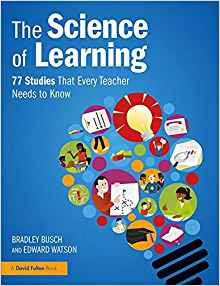This is an example of why hype can, in own way, be dangerous. It detracts time, energy and financial resources away from interventions that may be less exciting to look at but which actually work better.
Read MoreHow reliable is neuroscience?
If 10% of studies in neuroscience are flawed, how can you know which ones are OK?
Read MoreWords are important because they have connotations
You could imbibe the entire day’s news just by reading the first paragraph of each article in the newspaper. But what you would miss out on is any nuance or deep explanation. Unfortunately, when research in ed tech is reported in news outlets, the nuances and caveats, and useful information like sample size, are lost as well.
Read MoreBook review: Teachers vs Tech?
Two cheers for this well-researched book. If I were still a head of department in a school I would buy a copy or two to lend to interested colleagues, especially NQTs, despite my criticisms.
Read MoreYou’re going on a journey now, so document it. Image by Free-Photos from Pixabay
Covid19: Document it!
Looking on the bright side, if you have started teaching your classes online, or setting work for your pupils online, this forced closure of many schools is a great opportunity to carry out some research.
Read MoreArticles about AI in the media
Journalism in the field of AI: is it biased?
Read MoreResearch reading, by Terry Freedman
Teaching Computing: What the research says
What do we know about the pedagogy of teaching Computing? Do teachers spot students’ misconceptions? Can general principles of instruction be applied to the teaching of Computing? Plus other interesting questions.
Read MoreReview of The Science of Learning
This book aims to solve the difficulties teachers face in accessing educational research through the approach of presenting each research study as a double-page spread.
Read MoreResearch, by Terry Freedman
Engaging with evidence: a free guide
A new guide on engaging with evidence has appeared. Here is a quick evaluation of it.
Read MoreEducational research reading, by Terry Freedman
Evidence-based teaching: what's striking or new about it?
In the latest Ofsted annual report, teachers using an evidence-based approach is something that “strikes” the Chief Inspector. But what is remarkable about it?
Read MoreE-safety update
This article contains details of 8 reports and 4 sets of resources concerning e-safety.
Read MoreA great little book, at a little price.
What I've been reading: Research Question
A short book packed with useful advice.
Read MoreYes, OK, I’ll try out the computers, but please leave me alone! Photo by Anh Nguyen on Unsplash
Bombarding colleagues with research results regarding ed tech doesn't work
Gathering research findings into how beneficial education technology could be, er, beneficial. But there are caveats.
Read MoreRead all about it: what does the research REALLY say?
Even if a piece of education research is flawless (which itself is relatively unlikely), experience suggests that it's unlikely to be reported completely accurately, despite journalists' best efforts. Why does this happen?
Read MoreFake news, or just poor reporting?
Is the reporting of educational research merely poor or, worse, is it just made up? Here are a few notes in advance of my talk at ResearchEd on Saturday 8th September 2018.
Read MoreResearch reporting: how do you know if it's just fake news?
I’ve created an infographic on this topic. Read on for more details.
Read MorePhoto from pixabay.com Licence: CC0
Research, Alternative Facts or Fake News?
How can you tell whether news reports of new research in ed tech are accurate? I’ve created an 8-point infographic for this, based on my own work in this area. Read on to find out more, and how you can get hold of it.
Read MoreTake part in an education research survey
Professor Sarah Younie and her colleagues are undertaking research about, er, research. Do you find educational research useful in your teaching? What would make it more useful? Please take part in a brief survey that is looking into questions like these.
Read MoreIllustration by Mary, CC0
Classroom research for the Computing and ICT teacher
It's a great idea to do classroom-based research, but here are 7 caveats to bear in mind.
Read More4 go-to places for evidence-based education technology
How do you know what works in education technology? Here are details of 4 places you can go to on the web to find out.
Read More













